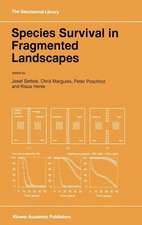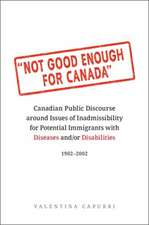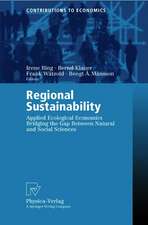Human - Wildlife Conflicts in Europe: Fisheries and Fish-eating Vertebrates as a Model Case: Environmental Science and Engineering
Editat de Reinhard A. Klenke, Irene Ring, Andreas Kranz, Niels Jepsen, Felix Rauschmayer, Klaus Henleen Limba Engleză Paperback – 2 apr 2015
| Toate formatele și edițiile | Preț | Express |
|---|---|---|
| Paperback (1) | 947.67 lei 6-8 săpt. | |
| Springer Berlin, Heidelberg – 2 apr 2015 | 947.67 lei 6-8 săpt. | |
| Hardback (1) | 1008.28 lei 6-8 săpt. | |
| Springer Berlin, Heidelberg – 12 apr 2013 | 1008.28 lei 6-8 săpt. |
Din seria Environmental Science and Engineering
- 18%
 Preț: 1238.42 lei
Preț: 1238.42 lei - 18%
 Preț: 2166.68 lei
Preț: 2166.68 lei - 18%
 Preț: 1420.88 lei
Preț: 1420.88 lei - 18%
 Preț: 914.20 lei
Preț: 914.20 lei - 18%
 Preț: 1225.94 lei
Preț: 1225.94 lei - 18%
 Preț: 1118.13 lei
Preț: 1118.13 lei - 18%
 Preț: 1402.74 lei
Preț: 1402.74 lei - 18%
 Preț: 3419.93 lei
Preț: 3419.93 lei - 18%
 Preț: 1223.55 lei
Preț: 1223.55 lei - 18%
 Preț: 1008.91 lei
Preț: 1008.91 lei - 18%
 Preț: 1234.46 lei
Preț: 1234.46 lei - 18%
 Preț: 1409.82 lei
Preț: 1409.82 lei - 18%
 Preț: 736.64 lei
Preț: 736.64 lei - 18%
 Preț: 949.73 lei
Preț: 949.73 lei - 18%
 Preț: 1287.47 lei
Preț: 1287.47 lei - 18%
 Preț: 2116.64 lei
Preț: 2116.64 lei - 18%
 Preț: 1231.95 lei
Preț: 1231.95 lei - 15%
 Preț: 641.71 lei
Preț: 641.71 lei - 23%
 Preț: 1129.31 lei
Preț: 1129.31 lei - 18%
 Preț: 1237.93 lei
Preț: 1237.93 lei - 18%
 Preț: 956.18 lei
Preț: 956.18 lei - 24%
 Preț: 1057.93 lei
Preț: 1057.93 lei - 24%
 Preț: 1079.06 lei
Preț: 1079.06 lei - 18%
 Preț: 953.03 lei
Preț: 953.03 lei - 18%
 Preț: 1233.06 lei
Preț: 1233.06 lei - 15%
 Preț: 666.73 lei
Preț: 666.73 lei - 18%
 Preț: 1222.31 lei
Preț: 1222.31 lei - 18%
 Preț: 1242.35 lei
Preț: 1242.35 lei - 18%
 Preț: 1232.89 lei
Preț: 1232.89 lei - 18%
 Preț: 1823.56 lei
Preț: 1823.56 lei - 18%
 Preț: 1228.96 lei
Preț: 1228.96 lei - 18%
 Preț: 1221.69 lei
Preț: 1221.69 lei - 18%
 Preț: 945.79 lei
Preț: 945.79 lei - 18%
 Preț: 1008.28 lei
Preț: 1008.28 lei - 24%
 Preț: 795.49 lei
Preț: 795.49 lei - 18%
 Preț: 1246.47 lei
Preț: 1246.47 lei - 18%
 Preț: 1239.85 lei
Preț: 1239.85 lei - 18%
 Preț: 957.62 lei
Preț: 957.62 lei - 18%
 Preț: 1244.89 lei
Preț: 1244.89 lei - 15%
 Preț: 640.55 lei
Preț: 640.55 lei - 18%
 Preț: 950.33 lei
Preț: 950.33 lei - 18%
 Preț: 1824.01 lei
Preț: 1824.01 lei - 15%
 Preț: 639.59 lei
Preț: 639.59 lei - 18%
 Preț: 947.50 lei
Preț: 947.50 lei - 18%
 Preț: 951.29 lei
Preț: 951.29 lei - 18%
 Preț: 1229.73 lei
Preț: 1229.73 lei
Preț: 947.67 lei
Preț vechi: 1155.69 lei
-18% Nou
Puncte Express: 1422
Preț estimativ în valută:
181.33€ • 189.84$ • 150.04£
181.33€ • 189.84$ • 150.04£
Carte tipărită la comandă
Livrare economică 05-19 aprilie
Preluare comenzi: 021 569.72.76
Specificații
ISBN-13: 9783642431098
ISBN-10: 3642431097
Pagini: 364
Ilustrații: XIV, 347 p.
Dimensiuni: 155 x 235 x 19 mm
Greutate: 0.51 kg
Ediția:2013
Editura: Springer Berlin, Heidelberg
Colecția Springer
Seriile Environmental Science and Engineering, Environmental Science
Locul publicării:Berlin, Heidelberg, Germany
ISBN-10: 3642431097
Pagini: 364
Ilustrații: XIV, 347 p.
Dimensiuni: 155 x 235 x 19 mm
Greutate: 0.51 kg
Ediția:2013
Editura: Springer Berlin, Heidelberg
Colecția Springer
Seriile Environmental Science and Engineering, Environmental Science
Locul publicării:Berlin, Heidelberg, Germany
Public țintă
ResearchTextul de pe ultima copertă
This book is about conflicts between different stakeholder groups triggered by protected species that compete with humans for natural resources. It presents key ecological features of typical conflict species and mitigation strategies including technical mitigation, policy instruments and the design of participatory decision strategies involving relevant stakeholders. The book provides not only case studies from various European countries, it also presents a framework for the development of biodiversity conflict reconciliation action plans that can be used globally.
Caracteristici
The book presents a structured procedure covering ecological and legal, economic, and social aspects of the wildlife conflicts





















